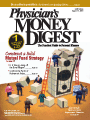Publication
Article
Physician's Money Digest
Know What to Do if You're Shown the Door
Author(s):
In today's changing business world, mostindividuals expect to hold several jobsduring their lifetime. Unfortunately, diffi-cult economic times have caused companiesto resort to layoffs and early retirementprograms in an effort to reducecompany expenses. Even doctors are susceptibleto this instability. When a layoffhappens to a doctor or their spouse, theyhave to make 2 important decisions:where to work next and what to do withtheir retirement assets.
CASH-OUT CONSEQUENCES
A job change can be stressful. Despitethe high level of stress involved, it's importantto take the time to think about whatto do with the accumulated savings youhave in your former employer's retirementplan. Many transitioning workers decideto take their retirement savings in cash. Ifyou need the cash to meet everydayexpenses, this may be your only option.However, if you're not in dire need of cashto meet expenses, you should consider theconsequences of cashing out.
First, if you cash out of your company-sponsoredretirement plan every time youchange jobs, you'll systematically erode 1of your most valuable sources of retirementincome. Most financially secureretirements are built on 3 income sources:Social Security, employer-sponsored retirementplans, and personal savings. If youcash out of your employer-sponsored plan,you risk seriously depleting that incomesource and possibly jeopardizing yourfinancial security in retirement.
Second, if you cash out of a company-sponsoredretirement plan, you'll oweincome taxes on the amount you receive.If you're younger than age 55 when youleave your job, you could owe an additional10% IRS early-withdrawal penalty.
Finally, when you cash out of a retirementaccount, you take away the opportunityto allow the savings to grow tax deferred.The longer you leave yourmoney in 1 plan, the more time it willhave to compound.
If you or your spouse are between jobsand are able to avoid cashing out of yourprevious employer's retirement plan, youhave some available options.
OPTIONS TO CONSIDER
Following is a brief description of 3very useful options to consider:
•Leave the money in your formeremployer's plan. If allowed, this can bethe simplest alternative, but it may notbe the best solution. On the plus side,you retain the funds'potential for tax deferredgrowth. On the other hand,your investment alternatives will continueto be limited to those offered by yourformer employer, which may or may notsuit your long-term objectives.
Note:
•Move the money into your newemployer's plan. Once you get a newjob, consider moving your retirementfunds into your new employer's plan.This will reduce the number of accountsyou need to track. Of course, first you'llneed to find out if your new employer'splan permits rollovers from other plans.Review your new plan carefully.The investment choices available in thenew plan may limit your options for reinvestingthe funds, and there may be differentdistribution rules.
•Roll the funds into an IRA. For mostindividuals under age 70, the most commonchoice is to roll over retirementfunds into a traditional IRA. Rolling yourfunds into an IRA lets you retain thefunds'tax-deferred growth potential. Italso gives you the benefit and convenienceof maintaining all your IRAs in 1place, making it easier to analyze youroverall asset allocation.
Unlike an employer-sponsored retirementplan, your IRA has many investmentoptions, giving you the flexibilityto select the options that can best helpyou achieve your investment objectives.Also, you have greater control over howyou use the IRA assets for income,because you aren't limited to the predeterminedincome schedules that arecharacteristic of employer plans.
is VP investments
and a financial consultant
with A. G. Edwards in
Hillsborough, NJ. He welcomes
questions or comments
at 800-288-0901 or www.agedwards.com/fc/joseph.lagowski. This article
was provided by A. G. Edwards & Sons,
Inc, member SIPC.
Joseph F. Lagowski
